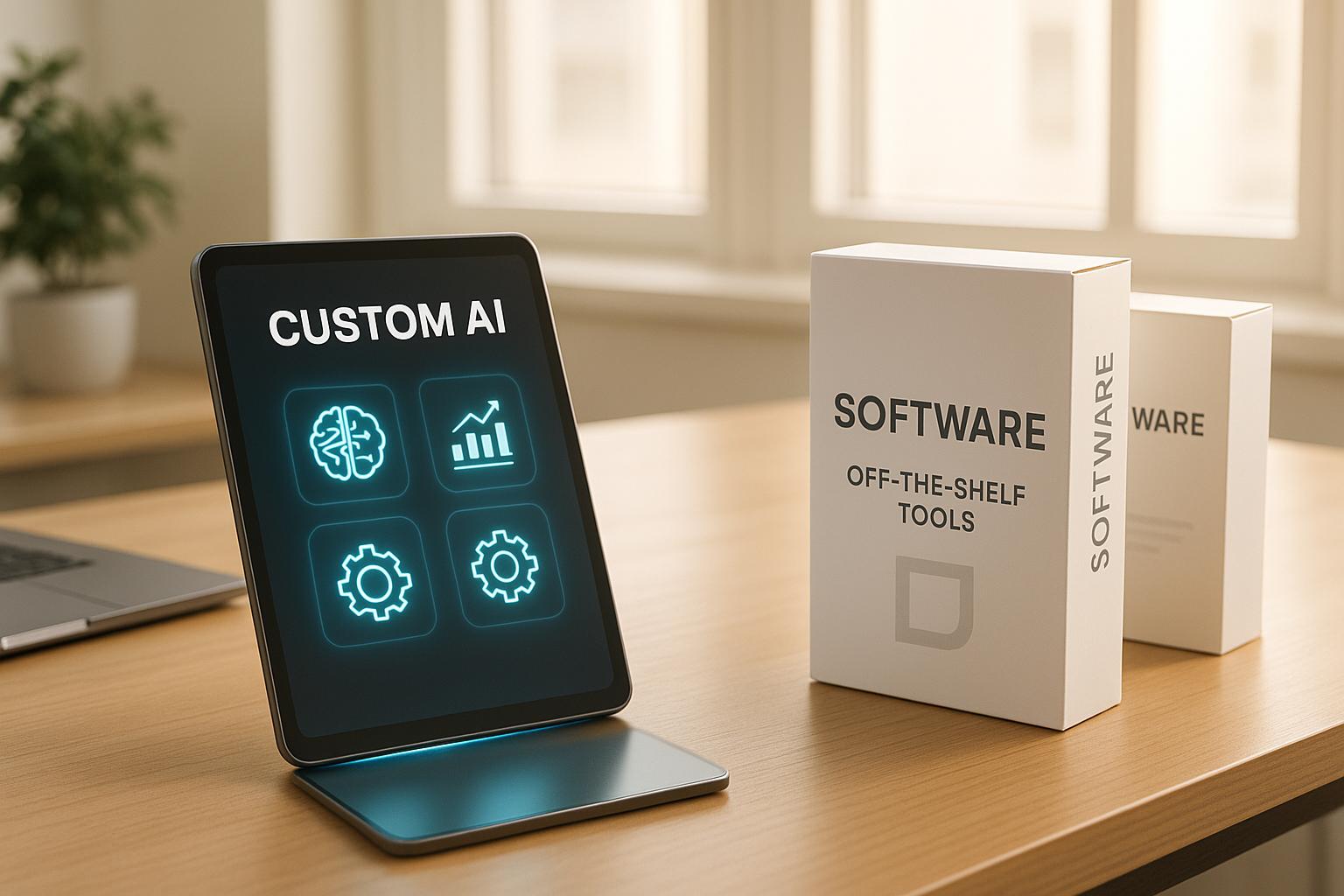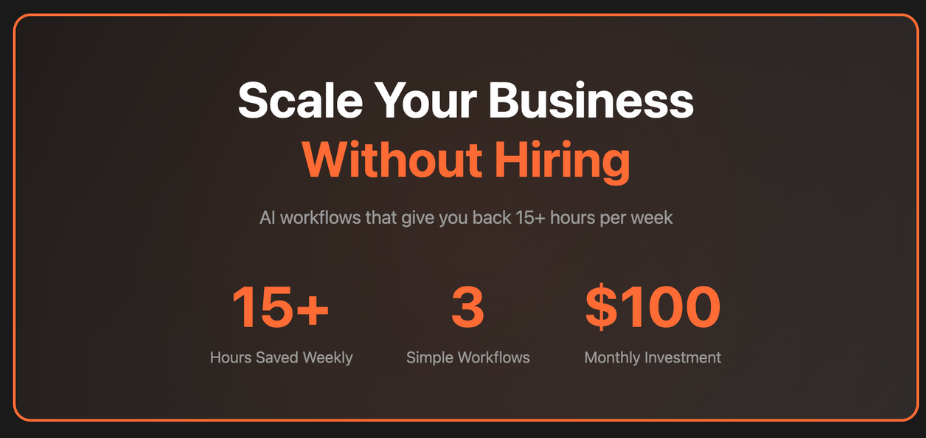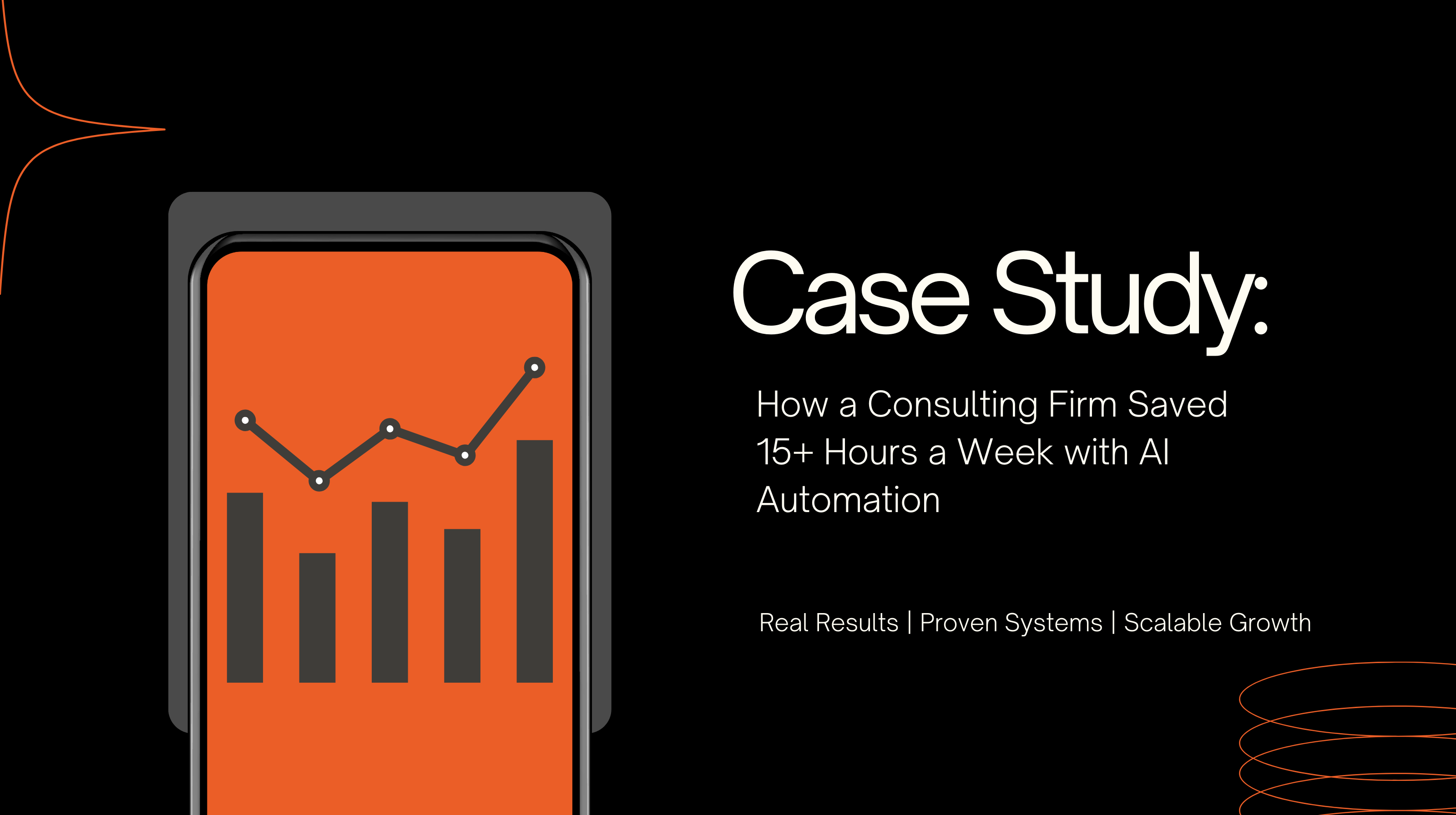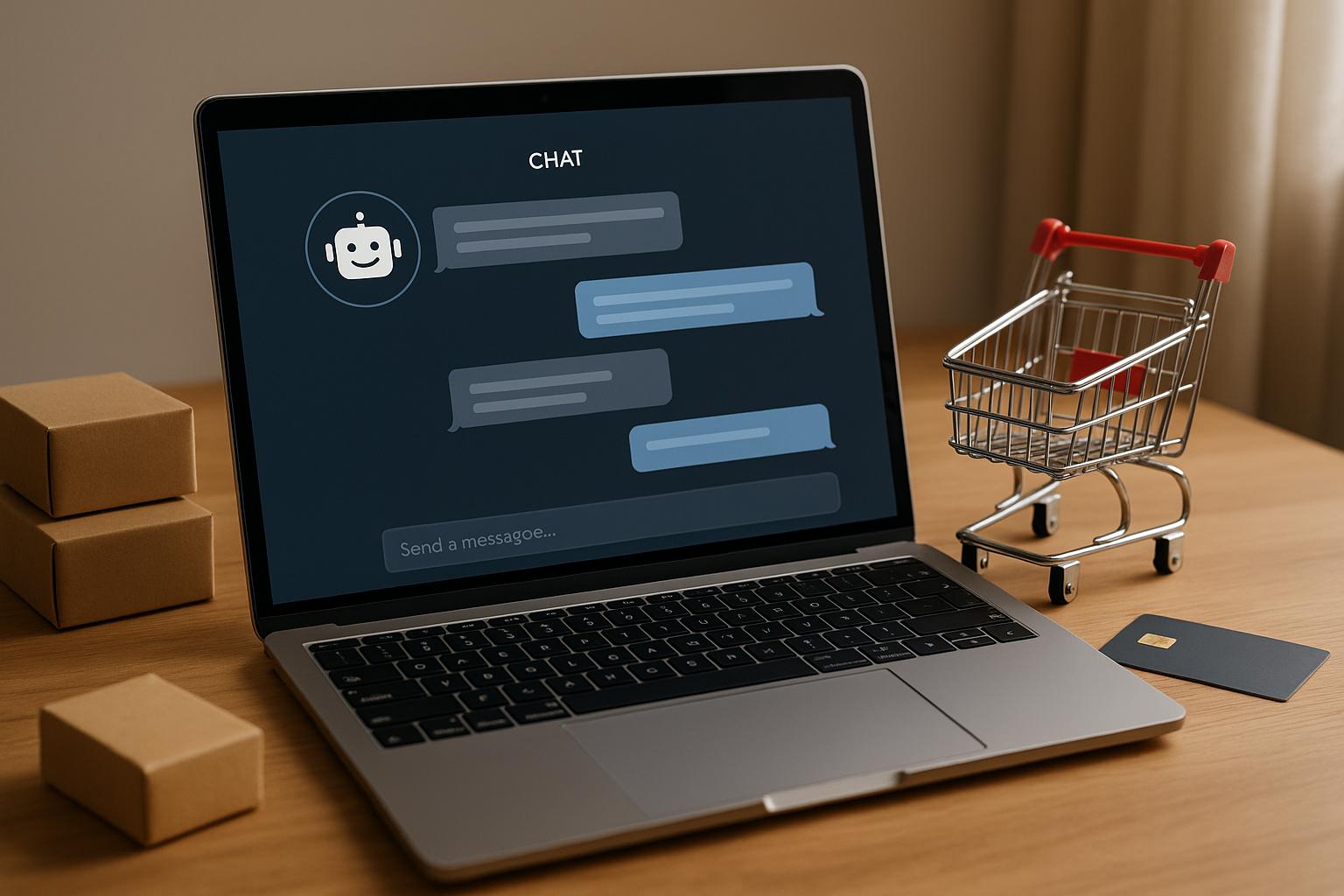When deciding between custom AI and off-the-shelf tools, the choice boils down to your business's specific needs, budget, and long-term goals. Here’s a quick breakdown:
Key Stats:
Quick Comparison:
Bottom Line: Choose off-the-shelf tools for quick, straightforward needs. Opt for custom AI if you’re focused on long-term growth and differentiation. Both have their place - your business goals will determine the right fit.
Custom AI Solutions
What is Custom AI?
Custom AI solutions are like having a bespoke suit tailored to your business needs. Unlike generic tools that fit a broad range of use cases, these systems are specifically designed to align with your workflows, goals, and challenges. Every aspect, from how data is processed to the user interface, is crafted to fit your business perfectly.
These solutions are particularly suited for businesses with complex operations or specialized industry requirements. They’re built to grow with you, handling current data volumes while preparing for future expansion. This scalability ensures that your investment continues to deliver results as your company evolves.
Let’s dive into the benefits that make custom AI a compelling choice for businesses.
Benefits of Custom AI
One of the biggest advantages of custom AI is its ability to seamlessly integrate with your existing systems. It’s designed to work exactly how your business needs it to, eliminating the need to adjust your processes or worry about compatibility issues.
For example, a building material distributor used a custom AI tool to analyze warehouse data and optimize inventory. The result? A 40% reduction in storage costs. This level of precision and customization is something off-the-shelf tools simply can’t match.
Custom AI also leverages your proprietary data to deliver top-tier performance. Take the case of a manufacturer that implemented a predictive maintenance system. By addressing their unique operational challenges, the system reduced downtime by 60%, significantly boosting efficiency.
Another key benefit is control over your data and security. Custom AI allows you to decide how your data is processed, stored, and accessed. This is especially important for businesses dealing with sensitive or regulated information, where data privacy is non-negotiable.
Challenges of Custom AI
Despite its advantages, custom AI comes with its own set of hurdles.
The upfront costs and development timelines can be daunting. Building a custom solution involves detailed planning, rigorous testing, and refinement, which means it may take time before you see results.
Scaling AI across an organization is another challenge. In fact, only 11% of businesses have successfully integrated AI into multiple areas of their operations. This highlights the difficulty of moving beyond pilot projects to full-scale implementation.
Maintenance and expertise are ongoing requirements. Custom AI systems need regular updates, performance monitoring, and optimization to stay effective, which adds to the overall cost of ownership.
Data quality is another critical factor. AI systems rely on clean, accurate, and accessible data to function properly. Poor data can undermine even the most advanced systems, making data preparation and governance essential but time-intensive.
Security and compliance are also significant concerns, especially in regulated industries. Over half of surveyed businesses cited data privacy and security as their top barriers to AI adoption. Establishing strong security measures and meeting compliance standards is a must.
When to Choose Custom AI
Custom AI is ideal for industries with complex and regulated environments, such as healthcare, finance, and manufacturing. These sectors often have unique requirements that demand tailored solutions.
For instance, a global retail chain uses a custom AI platform to integrate data from new stores as it expands into new regions. The system adapts to increased demand and changing workflows seamlessly, showcasing how these solutions can support significant growth.
Businesses focused on long-term scalability will also find custom AI a smart investment. These systems are designed to grow alongside your business, handling increasing data volumes and evolving user needs. Companies with proprietary data or unique business models stand to gain the most, as custom AI can turn operational strengths into measurable outcomes.
However, resource availability is a key consideration. Custom AI projects require a solid budget, ample time, and either in-house expertise or a trusted development partner to ensure success.
Devcore's Approach to Custom AI
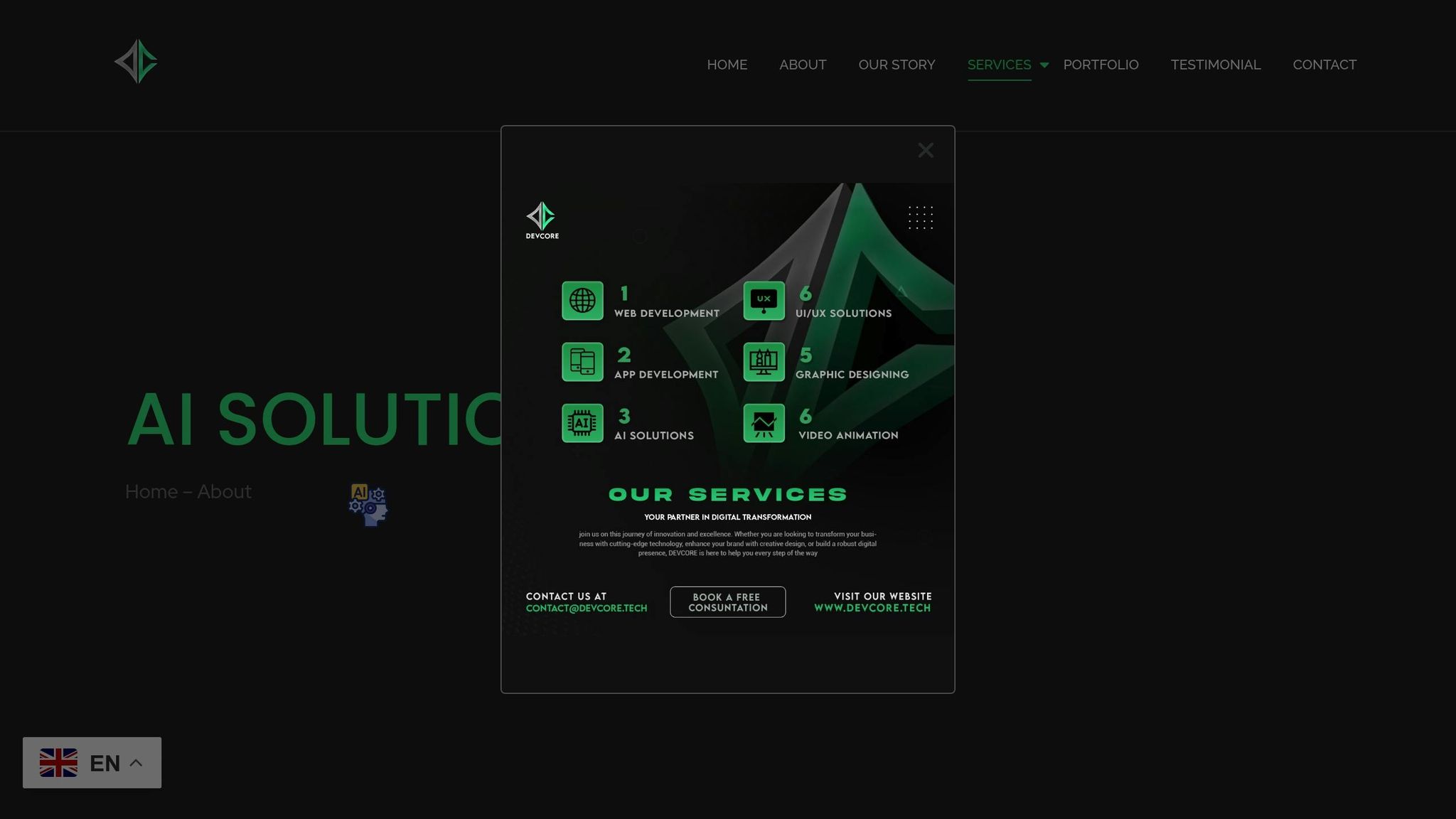
Devcore addresses these challenges head-on with its Leverage Blueprint™ strategy, which focuses on eliminating inefficiencies and delivering measurable results.
Their custom AI solutions cover three main areas: automating repetitive tasks (like CRM updates and data entry), enhancing decision-making and customer experiences with AI tools, and developing technical integrations for software and backend systems.
The process begins with a detailed analysis of your workflows to identify areas where AI can make the biggest impact. By focusing on real business challenges, Devcore ensures that its solutions offer tangible benefits rather than just deploying technology for the sake of it.
Devcore also emphasizes measurable outcomes. Their custom AI implementations come with clear success metrics and ongoing performance monitoring. This approach helps address a common issue: 74% of companies using AI report that they haven’t captured enough value from their investments. Devcore’s focus on results aims to change that narrative.
Off-the-Shelf AI Tools
What are Off-the-Shelf AI Tools?
Off-the-shelf AI tools are pre-built solutions designed to handle common business tasks across various industries and applications. These tools are ready to use right out of the box, making them a convenient option for companies looking to address everyday challenges without the need for extensive development. Their simplicity and accessibility make them easy to deploy, allowing businesses to see results quickly.
Benefits of Off-the-Shelf Tools
One of the biggest advantages of off-the-shelf AI tools is their speed. They can be implemented quickly, enabling businesses to achieve results in a short amount of time. These tools are particularly effective at automating repetitive, high-volume tasks. For example, they can improve customer service by using chatbots for 24/7 support, help identify trends through basic data analysis, or provide simple personalization like suggesting products based on browsing history.
Real-world examples highlight their effectiveness. Asian Paints used Nanonets to automate their accounts payable process, saving 192 hours every month and cutting invoice processing time by 90%. Similarly, the National Bureau of Economic Research reported that AI assistance like GPT boosted customer support agent productivity by 14%. Another case involves watsonx Code Assistant for Red Hat Ansible Lightspeed, which automatically generated 60% of Ansible Playbook content.
Limitations of Off-the-Shelf Tools
Despite their advantages, off-the-shelf AI tools have limitations. One major drawback is their limited customization, which means they might not fully meet the unique needs of specific industries. These tools are often designed for general use, so adapting them to specialized or complex workflows can be challenging. Integrating them with existing systems - especially custom or legacy platforms - may also require significant technical effort. Additionally, pre-built solutions might not align with a company’s brand voice, making them less effective for customer-facing tasks.
Scalability can also be a concern. Many off-the-shelf tools struggle to handle high workloads or complex workflows, which can limit their effectiveness as businesses grow. Data security and compliance are other potential issues, particularly in industries with strict privacy regulations. A Stanford University study found that a widely used chatbot answered 70% of complex questions incorrectly, highlighting the risks of relying too heavily on these tools for critical decisions. Furthermore, many of these solutions don’t support continuous learning, which can cause their performance to stagnate over time.
While these challenges exist, off-the-shelf tools still provide value for specific, straightforward tasks.
Best Use Cases for Off-the-Shelf Tools
Off-the-shelf AI tools work best for businesses with standardized, low-complexity needs. They are especially effective in areas like customer support automation. For instance, Intercom’s Resolution Bot can resolve up to 33% of routine customer queries without requiring human intervention.
"The responses and accuracy are phenomenal… there's significant flexibility in making changes and improvements." - Tal Gulst, Bot Manager, monday.com
These tools are also well-suited for tasks like document processing and workflow automation. They offer businesses a low-risk way to experiment with AI and evaluate its impact before committing to larger investments. Some companies have reported efficiency gains of up to 30% and overhead cost reductions as high as 25%. Additionally, off-the-shelf tools can be used for content creation, marketing automation, basic analytics, and simple personalization, making them a practical choice for businesses looking to streamline operations and achieve quick wins.
Custom AI Models vs ChatGPT: A Guide to Private Large Language Models
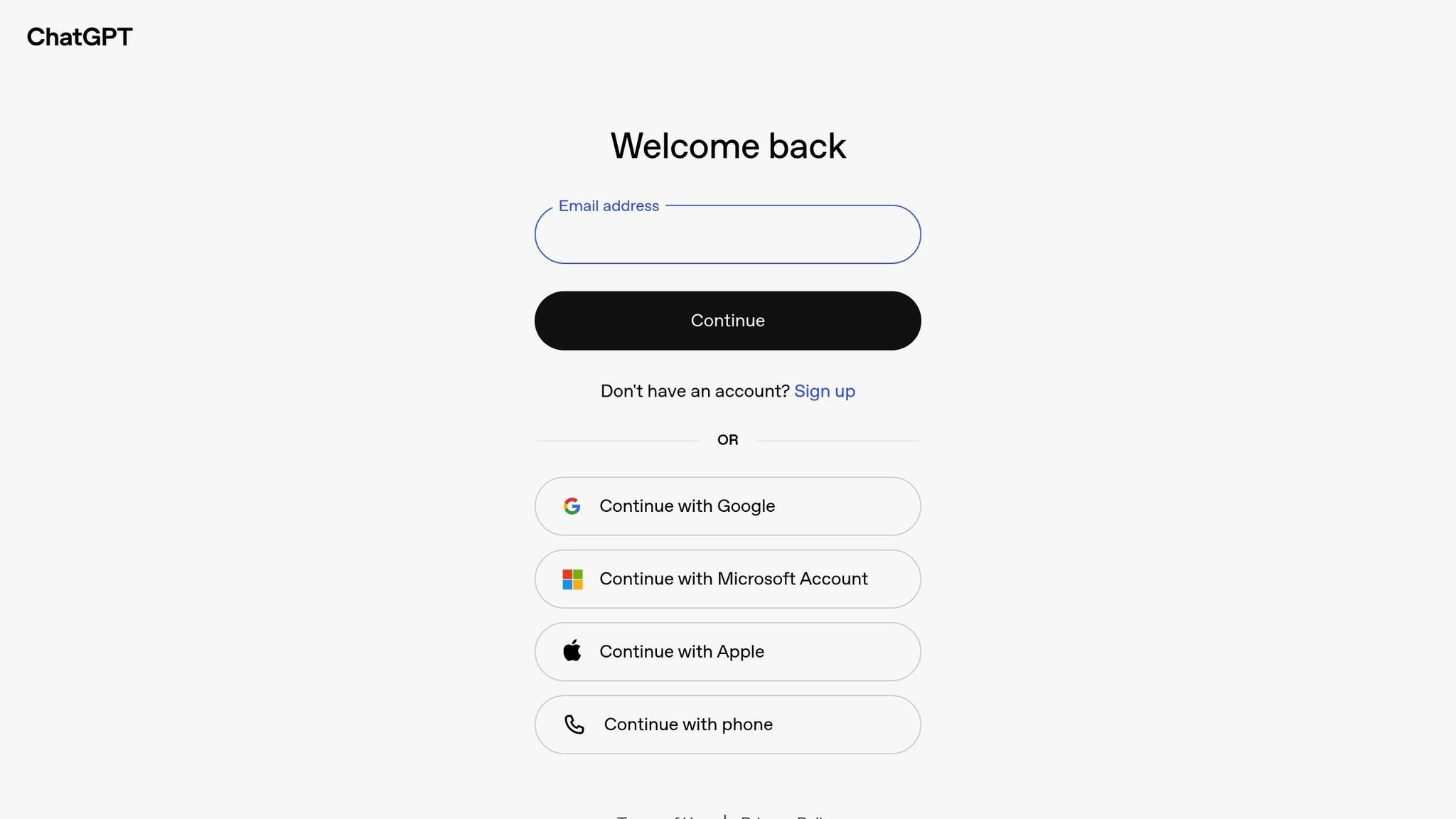
Custom AI vs. Off-the-Shelf Tools: Side-by-Side Comparison
When deciding between custom AI and off-the-shelf tools, it's essential to weigh factors like upfront costs, scalability, and long-term impact. Each option has its strengths, but the right choice depends on your business's needs and priorities.
Off-the-shelf solutions are appealing for their low initial cost and quick deployment. On the other hand, custom AI requires a larger upfront investment but can deliver transformative results over time, tailored to your specific operations.
Consider Walmart's experience with custom AI. In December 2024, the retail giant implemented a custom AI model for demand forecasting. By analyzing data from POS transactions, weather patterns, regional economic conditions, and even social media trends, the solution improved forecast accuracy by 30%, reduced stockouts by 20%, and cut inventory holding costs by 15%. These improvements drove an annual ROI exceeding US$1 billion.
In contrast, Holiday Extras opted for an off-the-shelf approach, using ChatGPT Enterprise to handle multilingual marketing and customer service. They had the system up and running in weeks, a timeline that would have been impossible with a custom solution. These examples highlight the trade-offs between speed and tailored functionality.
Comparison Table
Custom AI solutions demand significant upfront resources, but their long-term value often outweighs the initial cost, especially for businesses with complex operations. For example, a manufacturing company utilizing custom AI for predictive maintenance reduced machine downtime by 40%, saving US$500,000 annually. Retailers using custom AI for personalized recommendations also saw a 20% increase in conversion rates.
The timeline is another critical factor. Off-the-shelf tools can be operational in weeks, while custom AI projects typically take 6–18 months to fully deploy. Although slower to implement, custom AI solutions often deliver strategic advantages that justify the wait.
Scalability is a key consideration for long-term success. Custom AI is designed to evolve with your business, adapting to new challenges and market changes. In contrast, off-the-shelf tools may falter under the weight of growing data and complex tasks, potentially requiring additional investments or even a complete system overhaul.
Ultimately, the choice between custom AI and off-the-shelf tools depends on your business goals. If you need immediate results and have standardized processes, off-the-shelf solutions might be the better fit. However, if you're aiming for competitive differentiation and scalable growth, custom AI could be worth the investment. Carefully evaluating these trade-offs will help you make the best decision for your AI strategy.
How to Choose the Right AI Solution for Your Business
Selecting the right AI solution is all about aligning it with your business goals, available resources, and long-term growth plans. Whether you opt for custom AI or off-the-shelf tools, the choice should reflect your specific needs and vision. Here’s a breakdown of key considerations to guide your decision.
Factors to Consider
Business Complexity and Specific Needs
The complexity of your operations often dictates the best AI approach. If your business runs on standardized processes, off-the-shelf solutions might be a great fit. On the other hand, companies with unique workflows or niche needs often see better results with custom AI. Interestingly, almost 70% of businesses investing in AI report dissatisfaction because they chose a solution that didn’t match their requirements.
Budget and Long-Term Costs
Cost is another critical factor. Off-the-shelf tools are easier on the budget upfront, but custom AI can save on recurring vendor fees and licensing costs. For instance, a tech training incubator leveraged generative AI to streamline its contact center operations. This reduced response times from 24 hours to just 6, automated 80% of inquiries, and boosted customer satisfaction by 13%, leading to potential annual savings of $120,000.
Technical Expertise and Infrastructure
Consider your team’s technical skills and your existing infrastructure. Off-the-shelf solutions are ideal for organizations without specialized AI expertise, as they are easier to implement. However, custom AI requires either an in-house team of experts or strong partnerships with experienced developers.
Scalability and Growth Potential
Think about how your AI solution will grow alongside your business. Custom AI is built to scale and adapt to evolving needs, while off-the-shelf tools may hit limitations, requiring costly upgrades or replacements. Companies that embrace hyper-personalization through AI have been shown to achieve up to 40% more revenue.
Data Security and Compliance
For industries dealing with sensitive data or strict regulations, data security is paramount. Custom AI provides full control over data pipelines and can be tailored to meet specific compliance standards, offering peace of mind for businesses in regulated sectors.
Time-to-Market
Your timeline matters. Off-the-shelf tools can be deployed quickly for general use cases, delivering immediate results. Custom AI, while requiring a longer development period, offers benefits that compound over time as it gets fine-tuned to your needs.
Integration with Existing Systems
Seamless integration is key. Custom AI can be designed to fit perfectly with your current systems and workflows, while off-the-shelf tools may present compatibility challenges, requiring additional workarounds or adjustments.
By weighing these factors carefully, businesses can make informed decisions that align with their goals. For many, custom AI proves to be a smart investment for long-term success.
Why Custom AI Works Best for Long-Term Growth
For organizations focused on sustainable growth and differentiation, custom AI offers strategic advantages. With the global AI market expected to hit $2.58 trillion by 2032, growing at an annual rate of 19% from 2023, businesses have a significant opportunity to gain an edge by leveraging tailored solutions.
Creating a Competitive Edge Through Personalization
Custom AI makes hyper-personalization possible, delivering measurable outcomes. For example, 82% of businesses using AI-driven personalization report improved customer experiences, achieving five to eight times the return on marketing spend. Meanwhile, 78% of customers say they’re more likely to repurchase when they feel understood by a company.
Unlocking Proprietary Insights and Driving Innovation
Custom AI allows businesses to develop proprietary algorithms, offering insights that go beyond what off-the-shelf tools can provide. Owning your AI’s intellectual property opens doors to innovation and even monetization, while reducing reliance on third-party vendors. This level of control ensures that future enhancements align with your goals.
Delivering Tailored Solutions for Measurable Results
Custom AI addresses specific challenges with precision. Take Devcore’s approach, for instance. Their proprietary Leverage Blueprint™ identifies inefficiencies and creates tailored automations to streamline repetitive tasks, improve decision-making, and enhance customer experiences. By continuously evolving with user feedback, custom AI ensures ongoing value.
Custom AI serves as a powerful foundation for businesses looking to achieve long-term success. Devcore’s comprehensive solutions - ranging from CRM automations to AI-powered research agents and workflow optimization - demonstrate how tailored AI can help organizations with unique needs and ambitious goals thrive in a competitive landscape.
Conclusion
Selecting the right AI solution depends on your business goals, resources, and future plans. Both off-the-shelf tools and custom AI solutions have their strengths, catering to different needs and priorities.
Off-the-shelf AI tools are great when you need a quick, cost-effective solution for standard business operations. They’re perfect for companies with limited budgets, tight timelines, or a lack of technical expertise. However, their limitations often become apparent as your business grows, especially when scalability or adaptability is required.
Custom AI, on the other hand, offers a tailored approach with benefits like personalized solutions, competitive differentiation, and long-term value. While it demands a higher initial investment and more development time, it evolves alongside your business, offering proprietary insights and greater control over algorithms and data. Unlike off-the-shelf tools, custom AI can scale seamlessly with complex workflows and adapt to unique challenges.
For businesses aiming for sustainable growth and a competitive edge, custom AI provides a solid foundation. It allows you to create solutions that are uniquely yours, ensuring full control over data and processes while addressing the specific needs of your organization.
Ultimately, the choice comes down to what aligns best with your budget, timeline, technical capabilities, and long-term vision. Making an informed decision today can pave the way for strategic growth tomorrow. Evaluate your priorities carefully and choose the AI solution that best supports your business objectives.
FAQs
How do I choose between custom AI solutions and off-the-shelf tools for my business?
When deciding between custom AI solutions and off-the-shelf tools, it's important to weigh factors like cost, scalability, customization, security, and how well they align with your business goals.
Off-the-shelf tools are often more budget-friendly and quicker to get up and running. They’re ideal for businesses with straightforward requirements or tight budgets. That said, they can fall short when it comes to flexibility and scaling as your business evolves.
Custom AI solutions, however, are built specifically to address your unique challenges and workflows. While they demand a greater upfront investment - both in terms of time and money - they can provide a real edge by solving specific problems, streamlining operations, and delivering measurable outcomes. For businesses aiming to remove inefficiencies and grow sustainably, custom AI could be the better long-term investment.
What’s the long-term ROI of custom AI solutions compared to off-the-shelf tools?
Custom AI solutions are built to align perfectly with your business needs, often delivering a better long-term return on investment (ROI). While the initial cost might be higher, their ability to scale, deliver precise results, and adjust as your goals evolve makes them a smarter choice over time.
On the other hand, off-the-shelf tools might seem appealing due to their lower upfront cost. However, they often lack the flexibility and performance needed as your business expands. This can lead to extra expenses for workarounds or even replacing tools entirely, ultimately diminishing their overall value.
If your goal is to streamline processes, boost efficiency, and scale your operations effectively, custom AI solutions provide a clear advantage by tailoring technology to meet your specific objectives.
What challenges might businesses face when implementing custom AI solutions?
Implementing custom AI solutions comes with its fair share of challenges. One of the biggest obstacles is the high upfront costs, as building a system tailored to a business's needs demands a significant investment of time, resources, and specialized expertise.
Another critical concern is data privacy and security. Safeguarding sensitive customer and business information requires robust measures to prevent breaches or misuse. Beyond that, businesses often face difficulties when it comes to integrating AI systems with their existing tools and workflows. This can be a complex process, especially if legacy systems are involved.
The success of an AI system also hinges on having high-quality and sufficient data. Without it, the results may be inaccurate or unreliable. And then there are ethical concerns, such as mitigating algorithmic bias, which can have real-world consequences if not addressed properly.
Finally, businesses must tackle the learning curve for employees. Proper training is essential to ensure staff can effectively use and adapt to the new AI tools, maximizing their potential and delivering the desired results.
Related posts
- Manual Workflows Slowing Growth? AI Solutions
- Best AI Integration Platforms for Mid-Size Firms
- Ultimate Guide to Scaling Business with Automation
- Custom AI Models for Predictive Analytics
{"@context":"https://schema.org","@type":"FAQPage","mainEntity":[{"@type":"Question","name":"How do I choose between custom AI solutions and off-the-shelf tools for my business?","acceptedAnswer":{"@type":"Answer","text":"<p>When deciding between <strong>custom AI solutions</strong> and <strong>off-the-shelf tools</strong>, it's important to weigh factors like <strong>cost</strong>, <strong>scalability</strong>, <strong>customization</strong>, <strong>security</strong>, and how well they align with your business goals.</p> <p>Off-the-shelf tools are often more budget-friendly and quicker to get up and running. They’re ideal for businesses with straightforward requirements or tight budgets. That said, they can fall short when it comes to flexibility and scaling as your business evolves.</p> <p>Custom AI solutions, however, are built specifically to address your unique challenges and workflows. While they demand a greater upfront investment - both in terms of time and money - they can provide a real edge by solving specific problems, streamlining operations, and delivering measurable outcomes. For businesses aiming to remove inefficiencies and grow sustainably, custom AI could be the better long-term investment.</p>"}},{"@type":"Question","name":"What’s the long-term ROI of custom AI solutions compared to off-the-shelf tools?","acceptedAnswer":{"@type":"Answer","text":"<p>Custom AI solutions are built to align perfectly with your business needs, often delivering a <strong>better long-term return on investment (ROI)</strong>. While the initial cost might be higher, their ability to scale, deliver precise results, and adjust as your goals evolve makes them a smarter choice over time.</p> <p>On the other hand, off-the-shelf tools might seem appealing due to their lower upfront cost. However, they often lack the flexibility and performance needed as your business expands. This can lead to extra expenses for workarounds or even replacing tools entirely, ultimately diminishing their overall value.</p> <p>If your goal is to streamline processes, boost efficiency, and scale your operations effectively, custom AI solutions provide a clear advantage by tailoring technology to meet your specific objectives.</p>"}},{"@type":"Question","name":"What challenges might businesses face when implementing custom AI solutions?","acceptedAnswer":{"@type":"Answer","text":"<p>Implementing custom AI solutions comes with its fair share of challenges. One of the biggest obstacles is the <strong>high upfront costs</strong>, as building a system tailored to a business's needs demands a significant investment of time, resources, and specialized expertise.</p> <p>Another critical concern is <strong>data privacy and security</strong>. Safeguarding sensitive customer and business information requires robust measures to prevent breaches or misuse. Beyond that, businesses often face difficulties when it comes to <strong>integrating AI systems with their existing tools and workflows</strong>. This can be a complex process, especially if legacy systems are involved.</p> <p>The success of an AI system also hinges on having <strong>high-quality and sufficient data</strong>. Without it, the results may be inaccurate or unreliable. And then there are <strong>ethical concerns</strong>, such as mitigating algorithmic bias, which can have real-world consequences if not addressed properly.</p> <p>Finally, businesses must tackle the <strong>learning curve</strong> for employees. Proper training is essential to ensure staff can effectively use and adapt to the new AI tools, maximizing their potential and delivering the desired results.</p>"}}]}
